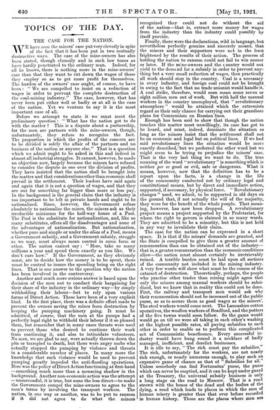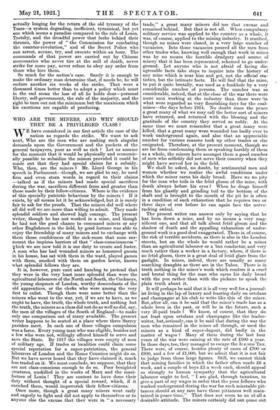TOPICS OF THE DAY. .
THE CASE FOR THE NATION.
WE have seen the miners' case put very cleverly in spite of the fact that it has been put in two mutually destructive ways. The case of the mine-owners has also been stated, though clumsily and in such low tones as have hardly penetrated to the ordinary man. Indeed, for all he knows, there is nothing more in the mine-owners' case than that they want to cut down the wages of those they employ so as to get more profit for themselves. The burden of the owners' case ought, of course, to have been : " We are compelled to insist on a reduction of wages in order to prevent the complete destruction of the coal-mining industry." The case, however, that has never been put either well or badly or at all is the case of the nation. Yet we venture to say it is the most important case of all. Before we attempt to state it we must meet the preliminary question : " What has the nation got to do with the matter ? This is a dispute about a partnership, for the men are partners with the mine-owners, though, unfortunately, they refuse to recognize the fact. The proportion in which the profits of the concern are to be divided is solely the affair of the partners and no business of the nation or anyone else." That is a question which we admit ought to be asked in this and indeed in almost all industrial struggles. It cannot, however, be made an objection now, largely because the miners have refused to consider the dispute as one over the division of profits. They have insisted that the nation shall be brought into the matter and that considerations other than economic shall prevail in the settlement. Their leaders have said again and again that it is not a question of wages, and that they are out for something far bigger than more or less pay. In the background is the general claim that the industry is too important to be left in private hands and ought to be nationalized. Since, however, the Government refuse absolutely to nationalize the mines, the miners ask as their irreducible minimum for the half-way house of a Pool. The Pool is the substitute for nationalization, and, like so many substitutes, offers all the disadvantages and none of the advantages of nationalization. But nationalization, whether pure and simple or under the alias of a Pool, means a Government subsidy, and a Government subsidy, struggle as we may, must always mean control in some form or other. The nation cannot say : " Here, take so many millions a year and spend them exactly as you like. We don't care how." If the Government, as they obviously must, are to decide how the money is to be spent, there must be control to insure the spending being on the right lines. That is one answer to the question why the nation has been involved in the controversy.
Another and much more serious answer is based upon the decision of the men not to conduct their bargaining for their share of the industry in the ordinary way—by simply withholding their labour—but to rely upon various forms of Direct Action. These have been of a very explicit kind. In the first place, there was a definite effort made to prevent the owners saving the mines from destruction by keeping the pumping machinery going. It must be admitted, of course, that the men at the pumps had a perfectly legal right to withhold their labour if it so pleased them, but remember that in many cases threats were used to prevent those who desired to continue their work from continuing it, and also to intimidate volunteers. No men, we are glad to say, were actually thrown down the pits or trampled to death, but there were angry mobs who actually stopped the pumping by violence and threats in a considerable number of places. In many more the knowledge that such violence would be used to prevent pumping greatly impeded the anti-flooding operations. Here was the policy of Direct Action functioning at first-hand —something much more than a menacing shadoW in the background. Another non-economic action was the attempt —unsuccessful, it is true, but none the less direct—to make the Government compel the mine-owners to agree to the men's terms by involving the transport workers. The nation, in one way or another, was to be put to ransom recognized they could not do without the aid of. the nation—that is, extract more money for wages from the industry than the industry could possibly by itself provide.
Finally, there were the declarations, wild in language, but nevertheless perfectly genuine and sincerely meant, that the miners and their supporters were nct in the least frightened by the results of their action. The process of holding the nation to ransom could not fail to win sooner or later. If the mine-owners and the country would not yield to the demand for a subsidy in order to prevent any- thing but a very small reduction of wages, then practically all work should stop in the country. - Coal is a necessary in every industry, and foreign coal could not be brought, in owing to the fact that no trade unionist would handle it. A coal strike, therefore, would soon mean some seven or eight million men out of work. But with half the manual workers in the country unemployed, that " revolutionary atmosphere " would be attained which the extremists regard as their only chance for carrying out their grandiose plans for Communism on Russian lines.
Enough has been said to show that though the nation touches this matter most unwillingly, its case has got to be heard, and must, indeed, dominate the situation so long as the miners insist that the settlement shall not be on economic and legal but on political lines. If we had said revolutionary lines the situation would . be more exactly described,-but we preferred the other word lest we might seem to be trying to prejudice the miners' case. That is the very last thing we want to do. The true meaning of the word " revolutionary " is something which is neither per se good or evil, safe or dangerous. What it means, however, now that the definition has to be a report upon the facts, is a change in the life of the community conducted not by ordinary legal and constitutional means, but by direct and immediate action. supported, if necessary, by physical force. " Revolutionary changes " used, we admit, to be supported in old days on the ground that, if not actually the will of the majority, they were for the benefit of the whole people. That mean- ing, however, has now been dropped. A revolutionary project means a project supported by the Proletariat, for whom the right to govern is claimed in so many words. They are admitted to be a minority, but this is not held in any way to invalidate their claim. The case for the nation can be expressed in a short space. It is that if the miners' demands are granted, and the State is compelled to give them a greater amount of remuneration than can be obtained out of the industry— that is, a greater remuneration than the economic conditions allow—the nation must almost certainly be irretrievably ruined. A terrible burden must be laid upon all sections of the community not included in the mining industry. A very few words will show what must be the course of the cataract of destruction. Theoretically, perhaps, the people who practise other trades than mining might agree that only the miners among manual workers should be subsi- dized, but we know that in reality this could not be done. First, the railway and transport men would ask why their remuneration should not be increased out of the public purse, so as to secure them as good wages as the miners'. The steel workers would come next. The Lancashire cotton operatives, the woollen workers of Bradford, and the potters of the five towns would soon follow. So the game would would go on till we were all taking in each other's washing at the highest possible rates, all paying subsidies to each other in order to enable us to perform this complicated act of Communistic beneficence. Every successful in- dustry would have hung round it a necklace of badly managed, inefficient, and derelict businesses. It is idle to say, " The rich must .pay the subsidies." The rich, unfortunately for the workers, are not nearly rich enough, or nearly numerous enough, to play such an expensive game of chance as that of " Subsidies for all. Unless somebody can find Fortunatus' purse, the purse which can never be emptied, and it can be kept under guard at the Treasury, the universal subsidy business is only a long stage on the road to Moscow. That is a road strewn with the bones of the dead and the bodies of the dying, a road which leads to places in which the sum of human misery is greater than that ever before recorded actually longing for the return of the old tyranny of the Tsars—a system degrading, inefficient, tyrannical, but yet one which seems a paradise compared to the rule of Lenin, Trotsky, and the dreadful power that lurks behind their thrones, the power of " the Commission for combating the counter-revolution," and of the Secret Police who can arrest, accuse, try, and execute within an hour. The commands of that power are carried out by Chinese mercenaries who never tire at the mill of death, never strike for more pay, never refuse to obey any order from those who hire them.
So much for the nation's case. Surely it is enough to make the ordinary man determine that, if needs be, he will endure another six weeks of the strike. That were a thousand times better than to adopt a policy which must in the end mean the loss of all he holds dear—personal liberty, self-government, the rule of the majority, and the right to turn out not the minimum but the maximum which his exertions are capable of producing.



































 Previous page
Previous page